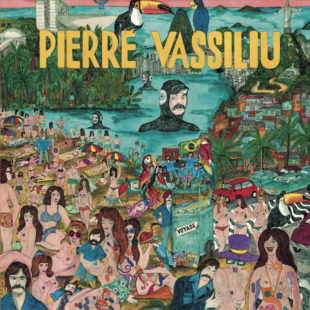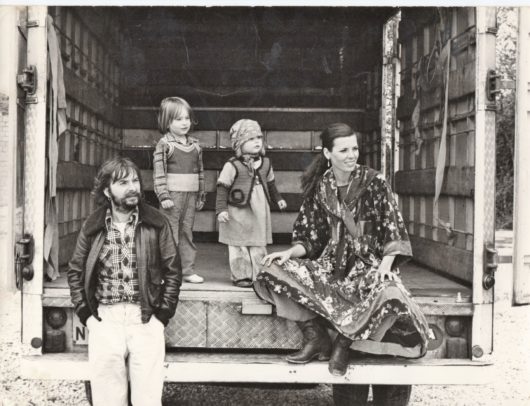
Pour Pierre Vassiliu, ‘Voyage’ était le titre d’un album et une philosophie de vie. Voyager, c’était pas les vacances ou le repos. C’était des rencontres, de nouvelles musiques et parfois la vie tout simplement. Son œuvre s’est nourrie de ces expériences autour du monde, sa carrière lui a permis de poser le pied sur chaque continent. Mais ses plus beaux voyages, il les a faits dans les studios d’enregistrement.
«Mes parents sont arrivés comme ça, sur une plage, avec un camping-car. Ils se sont posés et on est resté des années.» Assise au bord d’un lac à Sète, Léna Vassiliu raconte comment ses parents, Pierre et Laura, ont choisi un coin vide de la région de Casamance pour gagner quelques années à s’aimer au soleil. Légitime enfant du voyage, elle a été conçue au Sénégal. A l’époque, sa maman disait: «Je veux accoucher debout en tenant un arbre, dans le bois sacré où seules les femmes peuvent entrer!». Aujourd’hui, sa maman ajoute: «Pierre n’était pas chaud, on a fini dans une clinique à Dakar.» Laura Vassiliu vit toujours à Sète, dans le même appartement qu’avant. Le dessin original de Folon pour la pochette de ‘Voyage’, encadré dans le salon, intensifie le spectre de Pierre. Laura se souvient bien des beaux moments et les voyages en font partie. «Y avait pas que les moments qui étaient beaux. Pendant les voyages, lui aussi était plus beau.» Ça lui faisait du bien, à Pierre, de tourner le dos à la France probablement déjà moche, tourner le dos à l’industrie du disque volatile et mercantile, tourner le dos aux familiers qui reconnaissaient sa moustache mais pas son talent. Voyageur par obligation dans sa jeunesse (l’Algérie et sa guerre), il devint voyageur par goût et acquit le goût des autres, indispensable à quiconque veut trotter autour du globe. Il voyageait aussi par nécessité. Quand ça souriait moins, un bateau, un avion, salut les cons. Tous ces voyages, il les a ramenés dans ses chansons.
«Chaque fois qu’on voyageait quelque part, on était attiré par la musique. Pierre prenait le rythme du pays où on était et trouvait une chanson.» Laura Vassiliu
★
1968 ~1974
1967, Rio de Janeiro. Vêtu de blanc, Eddie Barclay cherche des artistes pour son label. Il tombe sur le trio Camara et leur chanteuse Tita Lobo, la trouve incomparable et les convie à Paris graver un disque. A St Germain des Prés, ils deviennent les branchés du moment, Pierre Barouh leur propose de sortir un 33tours instrumental sur son label Saravah, il sera enregistré au studio Davout par Yves Chamberland, qui à son tour propose au trio de créer le premier album de bossa en français. Une bande de chanteurs et d’auteurs se monte autour du projet ‘Les Masques’: Anne Vassiliu, Nicole Croisille, des membres des Swingle Singers et Pierre Vassiliu. Pierre chante à l’unisson sur trois chansons et en solo sur une, qu’il a écrite: ‘Initiation’ où il cherche ce qui se cache derrière les lieux communs sur le Brésil. Alors en pleine remise en question de sa carrière dans l’humour, il montre sur ce disque aux chanteurs masqués une facette authentique qui amorce le virage vers une musique personnelle.
Sa sœur Anne lui présente la bande à Bernard Lubat, Bloch-Lainé, Berteaux et Claude Engel. Ce dernier sort avec Anne, ça les rapproche. C’est lui qui a l’idée d’une chanson brésilienne pour le single de 1973, ‘J’ai trouvé un journal dans le hall de l’aéroport’. Le percussionniste Emmanuel ‘Pinpin’ Sciot en était: «Il y avait tellement d’idées et d’inspiration. La chanson passe par des phases très différentes. Le passage des chœurs, quelle galère, on manquait de pistes. Les harmonies étaient inspirées par Crosby Stills & Nash, la musique venait de Bach. Nos héros s’appelaient Maurice Ravel et Claude Debussy.»
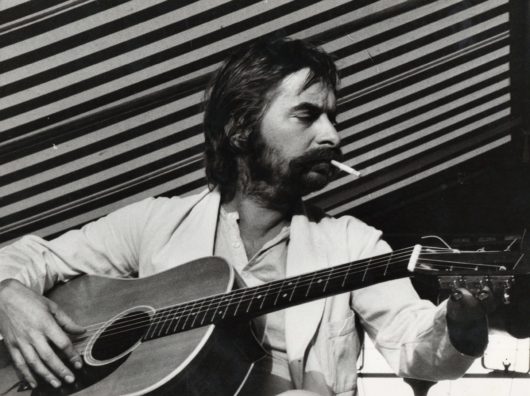
★
1975 ~ 1978
Premier effort après le foudroyant succès de ‘Qui c’est celui-là’, ‘Voyage’ sort en 1975. Il est rythmé par les secousses d’un train qui zigzague entre variétés, rythmes latins et jazz-funk inspiré de l’album de Herbie Hancock ‘Headhunters’, comme le prouve ‘Pierre bats ta femme’, un morceau au groove ricain, habillé de slaps de basse et de Clavinet (signé Georges Rodi) détonant un peu avec le thème du mari abandonné. Chronique de la vie ou prémonition, son couple avec Marie explose peu après, Laura est déjà dans son cœur. Il prend le large, son succès l’encombre. Mais poussé au cul par la maison Barclay, il tente de pondre un nouveau tube Brésil: ‘Tais-toi’, suivi de ‘Qu’il est bête ce garçon’, nettement plus réussi, en 1977. Laura y est présente, c’est elle qui répète la phrase-refrain. Ces singles n’auront pas de succès.
En 1978, il a changé. Auprès de Laura, il se sent rajeuni. Presque vingt ans les séparent. Son entourage musical bouge: Denis Van Hecke, le violoncelliste avant-gardiste belge, s’impose. Suit une bande de jazzeux hétéroclites contenant un pianiste martiniquais et des proches de Gong. A leurs côtés, Pierre se lâche dans l’improvisation, la voix qui aboie, les paroles qui ne riment plus. L’album s’appelle ‘Déménagements’, sur la pochette on le voit avec Laura, leurs enfants respectifs et leur camion. Pas un camion pour déménager, un camion pour vivre. «On l’avait transformé en camping-car, raconte Laura. Un copain nous avait fabriqué un faux permis poids lourd. On adorait ce camion. On était toujours en voyage. La bougeotte éternelle.» Le morceau d’ouverture, ‘L’oiseau’, voyage sur les terres de la poésie jazz et offre un trip halluciné à l’intérieur de son moi. Mais l’album sera son chant du cygne chez Barclay. Pas assez de succès.
«J’ai écarté mes ailes et sans parler à mon ombre, j’ai crié si fort que mon cri m’a devancé, me laissant sur place dans une nouvelle solitude.» Pierre Vassiliu (‘L’oiseau’)
★
1979 ~ 1980
Un autre label l’attend, RCA. Cette renaissance marque les débuts de Vassiliu l’africain. Au début, ce sont des voyages, bientôt il y vivra vraiment. Son nouveau disque, surnommé «la piscine» en référence à la pochette signée Daniel Authouart, est empli d’Afrique, et encore de reggae pour faire plaisir à sa jeune Laura, de progressif et d’impro. Denis Van Hecke constitue les fondations d’un nouveau groupe et invite son partenaire habituel, le clavier belge Frank Wuyts: «On était un groupe d’impro jazz free, on expérimentait, on travaillait avec des bandes. En studio, j’ai écrit des petites choses pour les chansons, j’ai été surpris de découvrir que Pierre m’avait crédité arrangeur.» L’Anglais Geoff Leigh: «Pierre nous a invité dans le midi enregistrer ce disque chez lui. L’ambiance était cool, sociable, il y avait des visites, des filles qui faisaient à manger, du vin, des drogues. Notre son, ce n’était pas la culture de Pierre mais il nous laissait faire. Une générosité magnifique. Il montrait les accords, chantait un peu et on improvisait.» La clarinette de Leigh et les percussions du camerounais Sam Ateba, hantent ‘Mange pas les bras Bokassa’, un titre cruel sur les touristes français qui viennent voir l’Afrique en évitant les salissures. Des types qui donnent leurs restes aux chats de l’hôtel sans un regard pour les enfants affamés derrière la grille.
On sent Pierre bien déprimé en 1979. Les voyages en Guadeloupe avec Laura l’adoucissent et inspirent de nombreuses chansons, notamment le single ‘Maryline’ et sa face B inédite ‘Fais-moi savoir’, hybride rock en français chaloupé Dom-Tom. Il trouvera sa place dans les concerts du début-80s, période ‘chaque titre part en impro’. Anne Vassiliu est souvent aux chœurs: «Parfois on était plus nombreux que le village où on jouait. Sur scène, Pierre parvenait à faire des choses qu’il ne savait pas faire sur disque, et le contraire était vrai aussi. Il nous arrivait (avec Laura) de chanter seins nus, le torse peint par Denis (Van Hecke), ou, avec Pierre, de rater notre entrée en scène parce qu’on fumait le pétard en coulisse. On était raides, on se collait au micro pour pas tomber. Chaque soir on devait souffler dans des bouteilles pour l’intro de ‘Tarzan’ (‘Il était tard ce samedi soir’), le morceau était tellement long qu’un musicien défoncé s’est évanoui!»
★
1981 ~ 1982
«Il débarquait, crade, râlant comme une bête sauvage, il était négatif, écœuré par le métier, se méfiait de chacun… RCA perdait conscience de son talent.» se souvient l’ex-attachée de presse, Brigitte Berthelot. «Travail, pour lui, c’était une insulte. Il était capable de ne pas venir sur une promo ou d’inviter quinze personnes à nos frais. Mais quand je venais le chercher en voiture, il m’attendait avec un cadeau pour mon fils.» Grâce à elle, il a la classe en veste blanche, un Melodica à la main, en train de chanter ‘Spiderman’ à la télé en 1982, une petite comptine des îles écrite sous la dictée de son fils Clovis sur l’album ‘Le cadeau’, qui a dû vivement désarçonner les chroniqueurs de variétés.
Juste après paraît un nouveau single, ‘C’est chaud l’amour’ et sa face B ‘Viens ma belle’, version contemporaine de ‘En Vadrouille à Montpellier’, invitation à un voyage urbain de bar en boîte se terminant dans un taxi parisien trop lent pour assouvir son envie de baiser. C’est le début d’une longue collaboration avec deux gamins: David Salkin et François Delfin. Ce dernier, guitariste, est l’auteur de la mélodie de ‘Viens ma belle’, jusque là utilisée en intro des concerts. Salkin est un ami de Dimitri Vassiliu (le fils), il a quinze ans la première fois que Pierre l’invite à jouer. « Il se régalait de nous écouter, nous offrait toute liberté. Malgré les soucis d’argent, il générait autour de lui des moments de fête, des tournées fantastiques. Un éternel bon vivant. Il m’a payé un djembé, le soir même j’en jouais sur scène. Il m’a confié la co-réalisation de ses disques (83/87). J’ai pu fréquenter des musiciens qui m’ont mis les poils, notamment Jim Cuomo» (clarinettiste sur ‘Viens ma belle’, entendu chez Pierre Barouh ou Marianne Faithful ‘Broken English’).
«Il n’avait pas envie d’être dans le système mais voulait en profiter.» Brigitte Berthelot
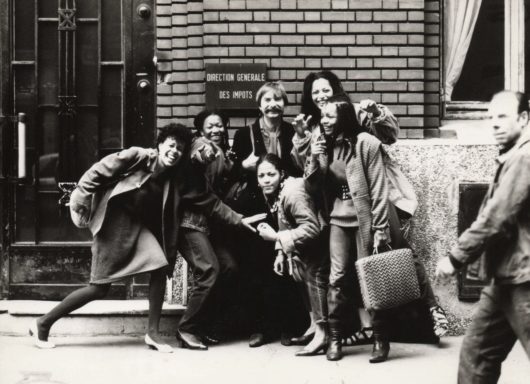
★
1983 ~ 2003
Viré de RCA, Pierre multiplie les voyages en Afrique et ça s’entend dans son nouveau disque, ‘Roulé Boulé’, qui déborde de percussions, koras et musiciens locaux. David Salkin: «Il était à fond, il avait aussi des danseuses. La world n’était pas encore à la mode, il était l’un des précurseurs, il l’a fait découvrir à tellement de monde. Le public qui allait le voir en concert ne s’attendait pas du tout à voir des Africains.» Musique noire et paroles noires, sur ‘Noix de cola’ Pierre rapporte l’histoire d’un jeune qui quitte son village pour la capitale et se fait tout voler sur la route, avec en conclusion un dilemme.
Dans la vraie vie aussi les nuages noirs arrivent: après un seul album sur CBS il est à nouveau remercié et doit rétrograder en label indépendant. Suivi d’un drame familial. C’est le début des très longues pauses au Sénégal. Envie de tendresse au soleil. L’amour renaît, Léna naît aussi, les Vassiliu reprennent un bar musical à Dakar, le Mamyflor, et Pierre écrit sur un cahier d’écolier ce qui deviendra ‘L’amour qui passe’ (1987), pochette ‘branchée’ et arrangements ‘modernes’. On y trouve le seul morceau afro-beat de Vassiliu, ‘Ça va ça va’, avec Tony Allen à la batterie, comme chez Fela, et l’évocation érotique d’une sorcière noire. Malgré la photo célèbre de Pierre en blackface, le disque ne vend pas assez et les labels des prochains CDs seront de plus en plus confidentiels.
Début 2000, la carrière discographique de Pierre semble à l’arrêt. Il faudra la force d’une poignée de fans dans sa ville, Mèze, pour permettre le financement d’un ultime album: ‘Pierre Précieuses’, mêlant Afrique, Guadeloupe, Amérique Latine, une reprise de Montand, une track “techno” et un folk dans lequel il incarne un fou. Son ami Patrick Robine: «’Pierre Précieuses’ était un compte-rendu définitif, un pot pourri de sa vie de voyages. Jusqu’au bout il a voulu transmettre la farce, la complicité, la malice. C’était un malicieux.» La chanson éponyme ‘Moustache’, issue de son goût pour la musique maloya réunionnaise, fournit une définition du travail qui le résume bien.
★
2014
Patrick Robine, qui a partagé de nombreux voyages avec Pierre, nous livre quelques secrets: «C’était la glande mais les journées étaient riches. Il attirait les aventures. On montait en voiture, il se passait un truc. Un nez pour dénicher des endroits fous qui n’avaient l’air de rien! On n’avait pas besoin d’aller loin, on rencontrait des gens, on voyageait à travers eux. Il aimait aussi s’asseoir au bout des pontons.»
Laura Vassiliu vit aussi avec ses souvenirs du Sénégal. Elle les ravive dans ses sculptures en terre cuite. «C’était le seul pays, disait-il, où il n’y avait pas de galère. A la fin de sa vie, il voulait repartir et y mourir. J’ai pas osé. Je regrette beaucoup. Je ne savais pas ce qu’était Parkinson. Je pensais qu’il fallait rester à côté d’un docteur. En fait ça ne servait à rien. Si je l’avais su à temps, je l’aurais emmené pour qu’il meure tranquille. C’était dur, la fin. Il ne pouvait plus jouer, il ne pouvait plus écrire, il devenait mince… Quand j’ai rencontré Pierre, j’étais mariée, j’avais 21 ans et deux enfants. Ç’a été un coup de foudre très emmerdant. Je pensais vivre une aventure avant de rentrer, mais non. Loupé! Pourtant personne n’y croyait.»
GUIDO CESARSKY
Merci à Laura Vassiliu, Léna Vassiliu, Anne Vassiliu, Brigitte Berthelot, Geoff Leigh Patrick Robine, David Salkin, Emmanuel Sciot, Frank Wuyts, Rémi Carémel, Catherine Philippe-Gérard, David Hadzis. Chaleureux saluts à Marie, Sophie, Clovis, Dimitri, Mélody et toute la famille Vassiliu. Bisous à mes familles Acid Arab, Crammed, Wart, XL, Psikopat et Viroflay. À Charlie.
//////////////////////////////////////
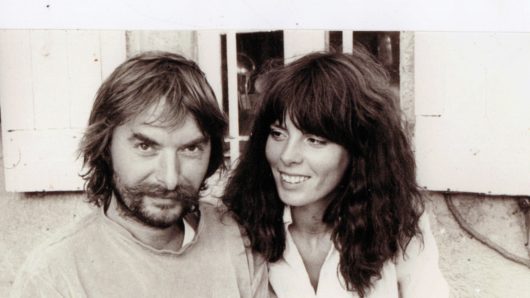
“Voyage”, to Pierre Vassiliu, was not only the title of an album of his, but also a philosophy of life. Travels were not for vacation or rest. They were synonyms of meetings, new music and sometimes, simply, life. These experiences around the world nourished his work, and his career allowed him to set foot on every continent. But his most beautiful travels took place in recording studios.
“My parents showed up on a beach, with a camper. They landed there and we stayed for years.” Sitting by a lake in Sète, Lena Vassiliu recounts how her parents Pierre and Laura chose an empty spot in the Casamance region to enjoy a few years loving each other under the sun. The legitimate child of this trip, she was conceived in Senegal. At the time, her mother said: “I want to give birth standing on my feet, holding a tree, in the sacred wood where only women can enter!” Today her mother adds: “Pierre was reluctant, so we ended up in a private hospital in Dakar.” Laura Vassiliu still lives in the same apartment in Sète. Folon’s original drawing for the artwork of the ‘Voyage’ LP is framed in the living room, making Pierre’s ghost more present. Laura remembers well the beautiful moments, and travels were a part of them. “Not only the moments were beautiful. On trips, he was more beautiful as well.” Pierre felt good turning his back on France – which was probably already ugly –, turning his back on the fickle, mercantile record industry, as well as on an entourage that recognized his mustache but not his talent. A traveler out of obligation in his youth (Algeria and its war), he became a traveler by taste and acquired an interest in people, an essential for anyone willing to travel the Globe. He also traveled out of necessity. When smiles faded, a boat, a plane, and bye bye idiots. And he brought all those trips back into his songs.
“Anytime we traveled anywhere, music attracted us. Pierre sensed the rhythm of the country we were in and he found a song.” Laura Vassiliu
★
1968 ~1974
1967, Rio de Janeiro. A white-dressed Eddie Barclay was looking for artists for his label. Coming upon the trio Camara and its singer Tita Lobo, he found her matchless and invited them to cut a record in Paris. They became the trend of the moment in St Germain des Prés; Pierre Barouh offered them to release an instrumental LP on his label Saravah, that would be recorded at Davout studio by Yves Chamberland, who in turn offered the trio to create the first French-language bossa nova album. A team of singers and writers formed around the project ‘Les Masques’: Anne Vassiliu, Nicole Croisille, members of the Swingle Singers and Pierre Vassiliu. Pierre sang in unison on three songs and solo on another one he wrote: ‘Initiation’, a questioning about what lies behind clichés about Brazil. While calling into question his career as an entertainer, he displayed, on this album with masked singers, an authentic side that initiated a shift towards some more personal music.
His sister Anne introduced Bernard Lubat, Bloch-Lainé, Berteaux and Claude Engel to him. The latter was dating Anne, which brought them closer. The idea of a Brazilian song for the 1973 single ‘J’ai trouvé un journal dans le hall de l’aéroport’ was his. Percussionist Emmanuel ‘Pinpin’ Sciot took part in it: “There were so many ideas, so much inspiration. The song goes through very different phases. The part with the backing vocals, what a hell – we were short of tracks. The harmonies were inspired by Crosby Stills & Nash, the music by Bach. Our heroes were Maurice Ravel and Claude Debussy.”
★
1975 ~ 1978
His first effort after the staggering success of ‘Qui c’est celui-là’, ‘Voyage’, came out in 1975, punctuated by the jolts of a train zigzagging between mainstream pop, Latin rhythms and Herbie Hancock’s ‘Headhunters’-inspired jazz-funk, as evidenced in ‘Pierre bats ta femme’, a piece with an all-American groove coated with bass slaps and Clavinet parts (courtesy of Georges Rodi), a bit incongruous, on the theme of the abandoned husband. Be it a chronicle of life or a premonition, his marriage with Mary broke soon after: Laura was already in his heart. He took off – his success embarrassed him. But, bulldozed by his label Barclay, he attempted to deliver a new Brazil-inspired hit: ‘Tais-toi’, followed by the much more accomplished ‘Qu’il est bête ce garçon’ in 1977. Laura was on it, her voice repeating the chorus line. These singles would not meet success.
By 1978, he had changed. With Laura he felt rejuvenated. They were almost twenty years apart in age. His musical entourage was changing as well: avant-garde Belgian cellist Denis Van Hecke imposed himself, followed by a heterogeneous pack of jazzheads, among which a Martinican pianist and members of Gong’s inner circle. By their side, Pierre let himself go, improvising, his voice barking, his words not rhyming anymore. The album’s title was ‘Déménagements’ [‘Moving house’]; on the cover, he and Laura, their respective children and their truck. Not a truck to move house – a truck to live in. “We had turned it into a camper van, Laura says. A friend had a fake truck license made for us. We loved this truck. We were on a constant trip. Perpetual wanderlust.” The opening track ‘L’oiseau’ roamed the realms of jazzy poetry, offering a hallucinogenic trip inside his ego. But this album was to be his swansong for Barclay. Insufficient success.
“I spread my wings and, without talking to my shadow, I screamed so loud that my scream outdistanced of me, leaving me in some new kind of loneliness.” Pierre Vassiliu (‘L’oiseau’)
★
1979 ~ 1980
Another label was awaiting him: RCA. This rebirth marked the beginning of Vassiliu’s African period. Journeys at first, before settling there soon after. His new record (nicknamed “the pool” in reference to its cover art by Daniel Authouart) was filled with African touches, with reggae, still, to please his young Laura, with prog and improv. Denis Van Hecke laid the bases for a new band, inviting his regular partner, Belgian keyboarder Frank Wuyts: “We were a free jazz improv band, we used to experiment, to work with tapes. In the studio, I wrote small parts to the songs, and I was surprised to discover that Pierre had credited me as an arranger.” Englishman Geoff Leigh: “Pierre invited us in the Midi to record at his place. The atmosphere was cool, sociable, with visitors, girls doing the cooking, wine, drugs. Our sound was alien to Peter’s culture but he would let us go. Wonderful generosity. He would show the chords, sing a little and we would improvise.” Leigh’s clarinet and Cameroonian Sam Ateba’s percussion haunted ‘Mange pas les bras Bokassa’, a cruel title about French tourists who came to see Africa avoiding exposure to dirt. Guys who would give their leftovers to the hotel’s cats without a glance at the hungry kids behind the gate.
Pierre seemed depressed in 1979. His trips to Guadeloupe with Laura softened him and inspired many songs, including the single ‘Maryline’ and its unreleased flip side ‘Fais-moi savoir’, a hybrid overseas-French rock sway that would find its place in his early-80s concerts, during his ‘every- title-turns-into-improvisation’ phase. Anne Vassiliu often took on backing vocal duties: “Sometimes, we were more numerous than the village where we’d play. On stage, Pierre managed to do things he couldn’t achieve on record – the opposite was true too. We (Laura and I) would occasionally sing topless, with our breasts painted by Denis (Van Hecke), or Pierre and I would sometimes miss our entrance onto the stage because we were smoking a joint backstage. We were stoned and would cling to the microphone in order not to fall. Every night, we had to blow into bottles for the ‘Tarzan’ intro (‘Il était tard ce samedi soir’); the song was so long that once a loaded musician fainted!”
★
1981 ~ 1982
“He would show up cruddy, grumbling like a wild beast, he was negative, sickened by the trade, suspicious of everyone… RCA was losing awareness of his talent,” recalls his former press agent Brigitte Berthelot. “’Work’, to him, was an insult. He was capable of missing a promo session or inviting fifteen people at our own expense. But when I came to pick him up with my car, he would be awaiting me with a present for my son.” Thanks to her, he had class in his white jacket, with a Melodica in his hand, singing ‘Spiderman’ on TV in 1982 – a little exotic nursery rhyme dictated by his son Clovis for the album ‘Le cadeau’, which must have strongly unsettled pop music reviewers of the time.
Just after that, a new single came out: ‘C’est chaud l’amour’ and its flip side ‘Viens ma belle’, a contemporary version of ‘En Vadrouille à Montpellier’ – an invitation to an urban trip through bars and clubs ending in a Parisian taxi that drives too slow to satisfy one’s lust. This marked the beginning of a long collaboration with two kids: David Salkin and François Delfin. The latter, a guitarist, had composed the melody for ‘Viens ma belle’, which was previously used as an introduction to concerts. Salkin was a friend of Dimitri Vassiliu’s (his son), he was fifteen the first time Pierre invited him to play with him. “Listening to us delighted him, he gave us entire freedom. Despite money problems, he would create moments of celebration around him, and fantastic tours. An eternal bon viveur. He bought me a djembe, which I played on stage on the very evening. He entrusted me to coproduce his records (1983-87). I had the opportunity to meet musicians who gave me goosebumps, including Jim Cuomo” (who played clarinet on ‘Viens ma belle’, also heard with Pierre Barouh or on Marianne Faithful’s ‘Broken English’).
“He did not want to be part of the system but he wanted to take advantage of it.” Brigitte Berthelot
★
1983 ~ 2003
Fired by RCA, Pierre multiplied trips to Africa, and you could hear it in his new record ‘Roulé Boulé’ which burst with percussion, koras and local musicians. David Salkin: “He was flat-out, he had dancers. World music was not trendy yet, he was one of its pioneers, he introduced it to so many people. The people who went to see him live did not expect to see Africans at all.” Black music with black words: ‘Noix de cola’ related the story of a young man leaving his village for the capital city, who got all his belongings stolen on the road and encounters a dilemma at the end.
In real life as well, black clouds were piling up: after a single album for CBS, he was dismissed again, having to retrogress to an independent label. Then a family tragedy followed. This was the beginning of a period of very long breaks in Senegal. Of a longing for tenderness in the sun. Love was born again, Lena was born as well; the Vassilius took over a music bar in Dakar – Le Mamyflor – and Pierre began writing down on a school notebook what would become ‘L’amour qui passe’ (1987), with its ‘hip’ cover and ‘modern’ arrangements. It included Vassiliu’s only afro-beat song: ‘Ça va ça va’, with Fela’s sidekick Tony Allen on drums, and the erotic evocation of a black witch. Despite Pierre’s famous ‘blackface’ photo, the disc didn’t sell enough and his next CDs were to be released by increasingly little-known labels.
By the beginning of the 2000s, Pierre’s recording career seemed to be at a standstill. It took the strength of a handful of fans from his town of Mèze to allow a final album to be funded: ‘Pierre Précieuses’, a blend of Africa, Guadeloupe and Latin America, with an Yves Montand cover, a “techno” track and a folk song in which he played a madman. His friend Patrick Robine said: “‘Pierre Précieuses’ was a definitive report, a pot-pourri of his life of travels. Until the end, he wanted to convey pranks, complicity and mischief. He was mischievous.” The eponymous song ‘Moustache’, an illustration of his taste for La Réunion’s Maloya music, provided a definition of work that sums it up well.
★
2014
Patrick Robine, who shared many trips with Pierre, revealed some secrets: “It was all about sloth, but our days were rich. He attracted adventures. We would get into a car and something would happen. A real flair for finding crazy places that didn’t look like it! We did not have to go far, we met people and we traveled through them. He also liked to sit at the end of pontoons.”
Laura Vassiliu also lives with her memories of Senegal. She rekindles them in her terracotta sculptures. “It was the only country with no hassle, as he used to say. At the end of his life he wanted to go back and die there. I did not dare. I’m very sorry about that. I did not know what Parkinson was. I thought you had to stay next to a doctor. In fact it was useless. If I had realized it in time, I would have taken him away so that he could die peacefully. It was hard, at the end. He was not able to play or compose anymore, he was losing weight… When I met Pierre, I was married, I was 21 and I had two children. It was love at first sight and it was a real drag. I thought I would just have an affair before returning to the fold, but no. No such luck! And yet, nobody would have bet on it.”
Thanks to Laura Vassiliu, Léna Vassiliu, Anne Vassiliu, Brigitte Berthelot, Geoff Leigh, Patrick Robine, David Salkin, Emmanuel Sciot, Frank Wuyts, Rémi Carémel, Catherine Philippe-Gérard, David Hadzis. Warm greetings to Marie, Sophie, Clovis, Dimitri, Mélody and all the Vassiliu family. Kisses to my families Acid Arab, Crammed, Wart, XL, Psikopat and Viroflay. To Charlie.
